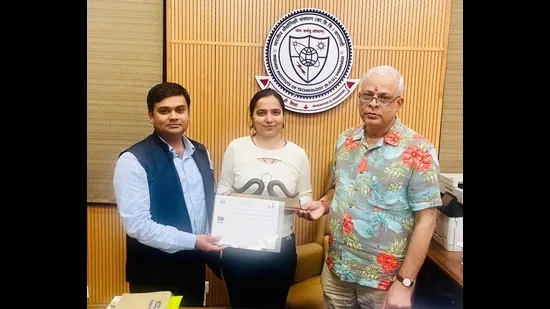

Led by research scholar Divya and Professor Pranjal Chandra from the School of Biochemical Engineering, a team at IIT-BHU has developed an innovative diagnostic tool for kidney health. The project also received significant contributions from Dr. Indrani Nandi, a DST National Postdoctoral Fellow under Prof. Chandra’s guidance, and BTech student Nachiket Mendki, reflecting the institute’s robust research ecosystem.
“This groundbreaking solution has the potential to transform kidney disease diagnostics, offering a more accessible, faster, and cost-effective alternative to traditional methods that rely on expensive lab equipment and trained personnel,” said Prof. Chandra. The paper microchip, enhanced through nanoengineering techniques on filter paper, detects two crucial biomarkers for kidney function: creatinine and albumin.
According to a press release from IIT-BHU, creatinine levels are measured using a smartphone-based imaging system, while albumin detection is facilitated by a specially designed 3D-printed cascade. The device is supported by CretCheck, an automated software that interprets the results, displaying a “green” signal for healthy individuals and “red” for those with kidney issues.
Prof. Chandra highlighted the device’s potential to enhance healthcare access, especially in resource-limited primary care settings. Unlike conventional diagnostics that require advanced equipment and lengthy wait times, this tool delivers results in less than 10 minutes, making it an efficient option for early detection of kidney disease.
As reported by Hindustan Times, the project received substantial backing from the School of Biochemical Engineering and stands as a testament to sustainable innovation aimed at tackling pressing healthcare challenges. Prof. Chandra noted that the platform has undergone extensive validation using human serum samples.
Initial tests on standard serum samples demonstrated high accuracy, and the team has begun collaborating with the IMS-BHU Department of Nephrology to obtain additional samples for pre-clinical trials, which are set to commence soon for comprehensive molecular analysis.
Prof. Chandra also pointed out the device’s adaptability as an integrated system capable of detecting various biomarkers for precision medicine.
He acknowledged the alignment of this work with national initiatives like “Make in India” and “Start-up India,” and expressed his gratitude to IIT-BHU Director Prof. Amit Patra for the institutional support that made this achievement possible.
Director Prof. Amit Patra praised Prof. Chandra and his team for their groundbreaking work. Additionally, PhD student Divya, under Prof. Chandra’s mentorship, was awarded the prestigious Gandhian Young Technological Innovation (GYTI) Award 2023 on November 5, 2024, at the India International Centre in New Delhi, for her pivotal role in developing the paper-based microdevice for kidney diagnostics.























